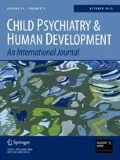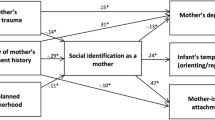Abstract
Mothers actively ascribe intention to the behavior of infants. Mothers also tailor their responses to infant behavior based on conceptions of how each response will influence later behavior. Fears of spoiling an infant may influence a mother's pattern of responsiveness. Sixty-eight at-risk African American mothers completed questionnaires assessing depressive symptoms, self-efficacy, empathy, developmental expectations, and beliefs about spoiling. Mothers with greater concerns about the long-term impact of spoiling reported higher levels of depression, more ways in which infants could be spoiled, and inappropriate developmental expectations when compared to mothers with fewer concerns. The pattern of findings suggests ways that fear of spoiling may influence maternal responsiveness in high-risk groups and potentially lead to disturbed mother–infant relationships.
Similar content being viewed by others
References
Feldman R, Reznick JS. Maternal perception of infant intentionality at 4 and 8 months. Inf Behav Dev. 1996;19:483-496.
Zeedyk MS. Maternal interpretations of infant intentionality: changes over the course of infant development. Br J Dev Psychol. 1997;15:477-493.
Reznick JS. Influences on maternal attribution of infant intentionality. In: Zelazo PD, Astington JW, Olson DR, editors. Developing Theories of Intention: Social Understanding and Self-control (pp. 243-267). Mahwah, NJ: Erlbaum, 1999.
Bell SM, Ainsworth MDS. Infant crying and maternal responsiveness. Child Devel. 1972;43:1171-1190.
Bowlby J. A Secure Base: Parent-child Attachment and Healthy Human Development. London: Basic Books, 1988.
Barnard KE, Martell LK. Mothering. In: Bornstein MH, editor. Handbook of Parenting (pp. 3-26). Mahwah, NJ: Erlbaum, 1995.
Gewirtz JL. The attachment acquisition process as evidenced in the maternal conditioning of cued infant responding (particularly crying). Hum. Devel. 1976;19:143-155.
Luster T, Rhoades K, Haas B. The relation between parental values and parenting behavior: a test of the Kohn hypothesis. J Marriage Fam. 1989;51:139-147.
Pascoe JM, Solomon R. Prenatal correlates of indigent mothers' attitudes about spoiling their young infants: a longitudinal study. Dev Behav Pediatr. 1994;15:367-369.
Cohn JF, Campbell SB, Matias R, Hopkins J. Face-to-face interactions of postpartum depressed and nondepressed mother-infant pairs at two months. Dev Psychol. 1990;26:15-23.
Field TM, Widmayer SM. Mother-infant interactions among lower SES Black, Cuban, Puerto Rican and South American immigrants. In: Field T, Vietze P, Leiderman P, editors. Culture and Early Interaction (pp. 41-62). Hillsdale, NJ: Erlbaum, 1981.
Solomon R, Martin K, Cottington E. Spoiling an infant: further support for the construct. Top Earl Child Spec Ed. 1993;13:175-183.
Nelms BC. Attachment versus spoiling. Pediatr Nurs. 1983;9:49-51.
Wilson AL, Witzke DB, Volin A. What it means to “spoil” a baby: parents' perception. Clin Pediatr. 1981;20:798-802.
Stoiber KC, Houghton TG. The relationship of adolescent mothers' expectations, knowledge, and beliefs to their young children's coping behavior. Infant Ment Health J. 1993;14:61-79.
Zeanah CH, Anders TF. Subjectivity in parent-infant relationships: a discussion of internal working models. Infant Ment Health J. 1987;8:237-250.
Beck AT, Ward CH, Mendelson M, Mock JE, Erbaugh J. An inventory for measuring depression. Gen Psychiatry. 1961;4:561-571.
Beck AT, Steer RA, Garbin MG. Psychometric properties of the Beck Depression Inventory: twenty-five years of evaluation. Clin Psychol Rev. 1988; 8:77-100.
Bavolek SJ. Manual for the Adult-Adolescent Parenting Inventory. Madison, WI: Family Development Association, 1984.
Teti DM, Gelfand DM. Behavioral competence among mothers of infants in the first year: the mediational role of maternal self-efficacy. Child Devel. 1991;62:918-29.
Crowne DP, Marlowe D. A new scale of social desirability independent of psychopathology. J Consult Psychol. 1960;24:349-354.
Zook A, Sipps GJ. Cross-validation of a short form of the Marlowe-Crowne Social Desirability Scale. J Clin Psychol. 1985;41:236-238.
Rogosch FA, Cicchetti D, Shields A, Toth SL. Parenting dysfunction in child maltreatment. In: Bornstein MH, editor. Handbook of Parenting (pp. 127-159). Mahwah, NJ: Erlbaum, 1995.
Roosa MW. Short-term effects of teenage parenting programs on knowledge and attitudes. Adolescence. 1984;19:659-66.
Gibbs N. Who's in charge here. Time. August 6, 2001; 158: 40-49.
Feshbach ND. The construct of empathy and the phenomenon of physical maltreatment of children. In: Cicchetti D, Carlson DCV, editors. Child Maltreatment: Theory and Research on the Causes and Consequences of Child Abuse and Neglect (pp. 349-375). Cambridge: Cambridge University Press, 1989.
Reznick JS, Schwartz BB. When is an assessment an intervention? Parent perception of infant intentionality and language. J Am Acad Child Adolesc Psychiatry. 2001;40:11-17.
Kelley ML, Power TG, Wimbush DD. Determinants of disciplinary practices in low-income black mothers. Child Devel. 1992;63:573-582.
Zeanah CH, Boris NW, Larrieu JL. Infant development and developmental risk: a review of the past 10 years. J Am Acad Child Adolesc Psychiatry. 1997;36:165-177.
Field TM. Psychologically depressed parents. In: Bornstein MH, editor. Handbook of Parenting (pp. 85-99). Mahwah, NJ: Erlbaum, 1995.
Seifer R, Dickstein S. Parental mental illness and infant development. In: Zeanah CH, editor. Handbook of Infant Mental Health, 2nd ed. (pp. 145-160). New York: Guilford, 2000.
Davidson JR, Meltzer-Brody SE. The underrecognition and undertreatment of depression: what is the breadth and depth of the problem? J Clin Psychiatry. 1999; 60Suppl 7:4-9; discussion 10–11.
Author information
Authors and Affiliations
Rights and permissions
About this article
Cite this article
Smyke, A.T., Boris, N.W. & Alexander, G.M. Fear of Spoiling in At-Risk African American Mothers. Child Psychiatry Hum Dev 32, 295–307 (2002). https://doi.org/10.1023/A:1015270511217
Issue Date:
DOI: https://doi.org/10.1023/A:1015270511217




